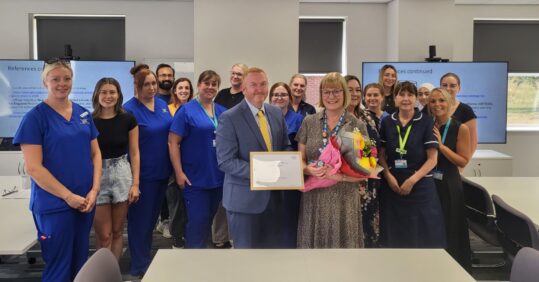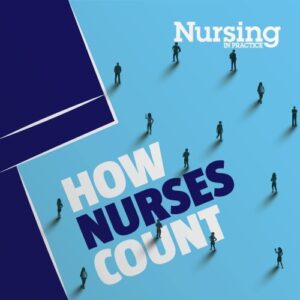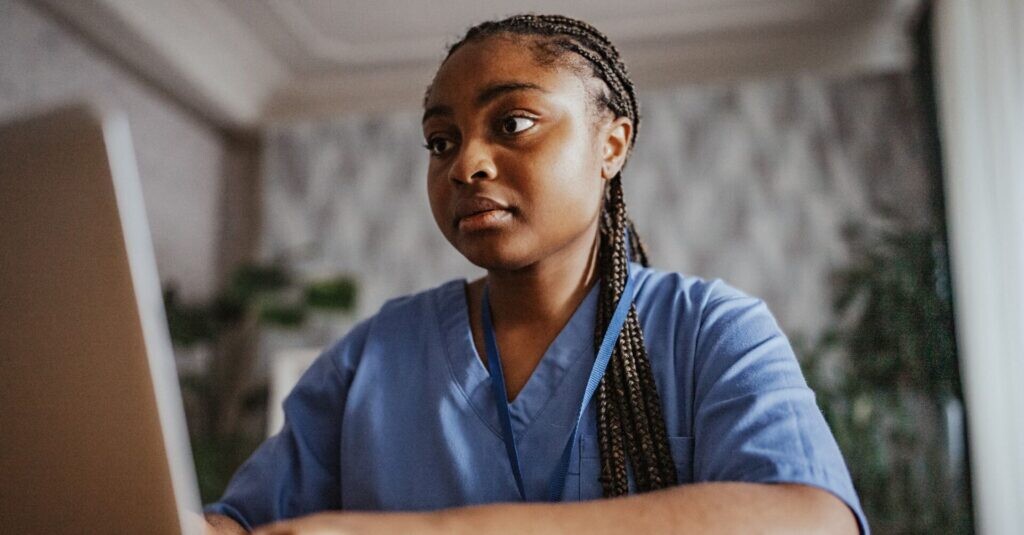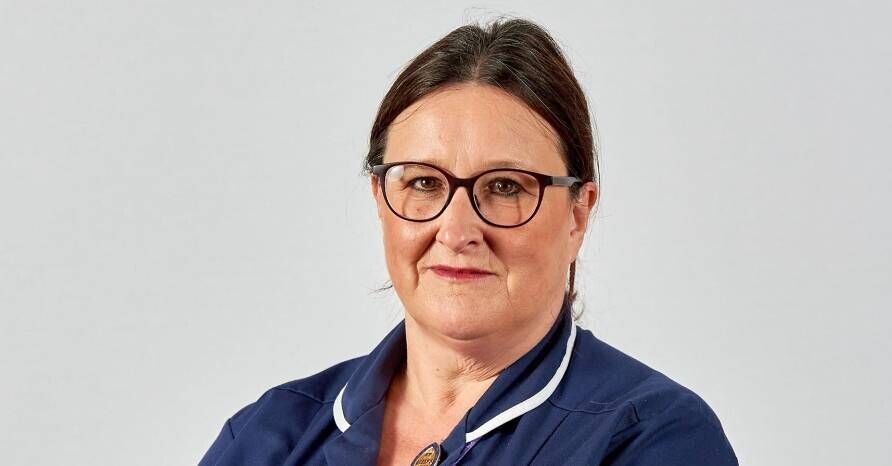‘Being a GPN is not a basic role – we are vital to public health’

It is important to show that general practice nursing ‘is not a basic role’ but in many ways a profession that is ‘enhanced and advanced’ from the get-go, says Staffordshire Training Hub general practice nurse facilitator and Queen’s Nurse, Gill Boast. As part of the Nursing in Practice How Nurses Count campaign, Ms Boast reflects on her 47-year career, her recent national chief nursing officer award, and the ways in which she believes general practice nurses count.
‘It’s always hard to sing your own praises. Nurses especially find it difficult, but I do think we undersell ourselves,’ says Ms Boast.
‘The practice nurse role is immense, and it is one of the most challenging roles I have done in my career. I really thought it would be an easy job to do, and it really wasn’t.’
Ms Boast, who started as a nursing student in 1978, has worked in general practice since 1998. Before becoming a GPN, she was previously a school nurse, a trauma ward sister, and a staff nurse in A&E and general surgery.
She currently works as a Staffordshire Training Hub GPN facilitator and is the training programme lead at an innovative foundation training school for nurses new to general practice – including those newly qualified.
‘I think the nicest thing to do is to share your knowledge and bring on the next generation of nurses,’ says Ms Boast.
‘I’ve always tried to do that even when I was working in secondary care, I always had student nurses with me, and I’ve always brought student nurses along into general practice. And now we’re running the foundation school.’
The GPN Foundation School in Staffordshire launched in 2023 to help standardise training and move away from a ‘pick and mix’ of education that many GPNs face.
Related Article: Only 25% of practice nurses have heard from employer about 2025/26 pay rise
Ms Boast said it was ‘rewarding’ to see many nurses joining the programme being newly qualified.
‘We’re bringing newly qualified nurses into general practice as the norm – half of the group are newly qualified. And that’s so rewarding in lots of ways,’ she says.
‘Bringing on the next generations has to be the way forward if we’re going to keep retention and recruitment.’
She adds: ‘I learn as much from them as I’m sure they do from me to be honest. That’s the great thing about teaching. It’s definitely sharing knowledge in lots of ways.’
Last month, Ms Boast was awarded the Silver Chief Nursing Officer award, which recognises performance that goes ‘above and beyond the expectations of the everyday role’ as a nurse.
She was given the accolade by deputy public health nurse for England, Professor Jamie Waterall, in front of her GPN school cohort.
‘It is amazing. I’m so delighted and it was such a surprise,’ she says about the award.
‘It was a real honour to be nominated for it and to receive it, especially when I was with the general practice nurse school. It was good for the trainees as well to see.’
She says she hopes her award goes some way in showcasing the excellent work and skills of GPNs and in promoting the role to others.
‘I think by receiving the award I feel it is shining a light on the general practice nurse role, which I’m really delighted about,’ adds Ms Boast.
She describes practice nurses as the ‘unsung heroes’ of the NHS, ‘often unrecognised’.
‘It is a very diverse, very unique role across all of the age ranges and covering from preconception even to end of life,’ she says.
‘I don’t know of any other nursing roles that covers quite such a diverse range in such variety.’
Related Article: Interview: New QICN chief on priorities, challenges and the 10-year plan
Ms Boast adds: ‘I hope my award helps to promote the GPN role all round in many ways. It’s lovely to be able to showcase the practice nurse role in that way by receiving an award. I’m very grateful for that.
‘I have had a fabulous nursing journey, and it’s not over yet, but I hope it’s shown the trainees what you can do with your career and what can happen.’
How Nurses Count!
This article is part of the How Nurses Count campaign, launched last month to champion the work of practice nurses and shine a light on all the ways in which they make a difference.
 The How Nurses Count campaign is seeking out good examples of the impact of nurses in general practice, whether that is in patient consultations, clinics, team meetings, as clinicians, leaders, advocates for patients, prescribers, problem-solvers, and more. The hope is to evidence the contribution of GPNs to the government and key health leaders to ensure the profession is better recognised and valued.
The How Nurses Count campaign is seeking out good examples of the impact of nurses in general practice, whether that is in patient consultations, clinics, team meetings, as clinicians, leaders, advocates for patients, prescribers, problem-solvers, and more. The hope is to evidence the contribution of GPNs to the government and key health leaders to ensure the profession is better recognised and valued.
For this article, Ms Boast was asked to reflect on how she counts as a nurse in general practice.
‘I think it’s important that we do show that it’s not just a basic role, it’s very much enhanced and advanced practice in many ways from the get-go,’ she says.
‘You’re working autonomously, often on a one-to-one basis with your patient, and having to make on the spot decisions. It is difficult. It’s certainly not for the faint hearted, but I do think we do count so much.
‘We do such a vital role in public health across the whole age ranges, and we really need to make sure we’re at the forefront of the [government’s] new plans [for the health service].
Related Article: What we know so far about the government’s nurse ‘Graduate Guarantee’
‘Nurses – because we have such a holistic look across our patients and we’re able to cover such a wide remit – that’s why we count.’
Ms Boast also reflected on the way in which her work to support the next generation made her ‘count’.
Planning for the future is ‘vital’, she says. ‘To make sure they are having adequate training and development and career progression because it is a great career.’

See how our symptom tool can help you make better sense of patient presentations
Click here to search a symptom





![Menopause: identification and management [NG23]](https://s3-eu-west-2.amazonaws.com/images.nursinginpractice.com/wp-media-folder-nursing-in-practice/wp-content/uploads/2025/03/PULSE-NIP-UPLOAD-BAYER-NICE-MENOPAUSE-A5-HANDBOOK.jpg)
